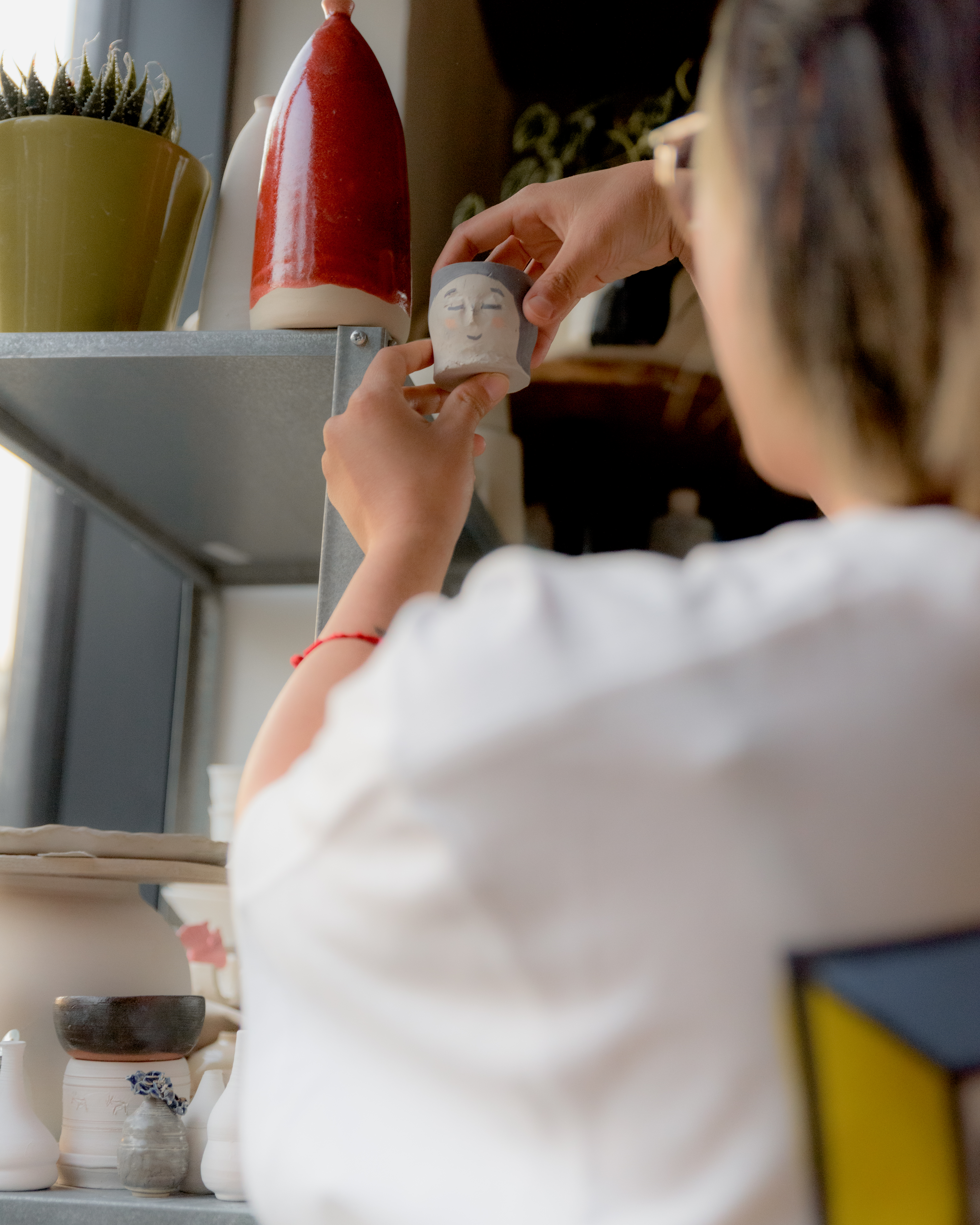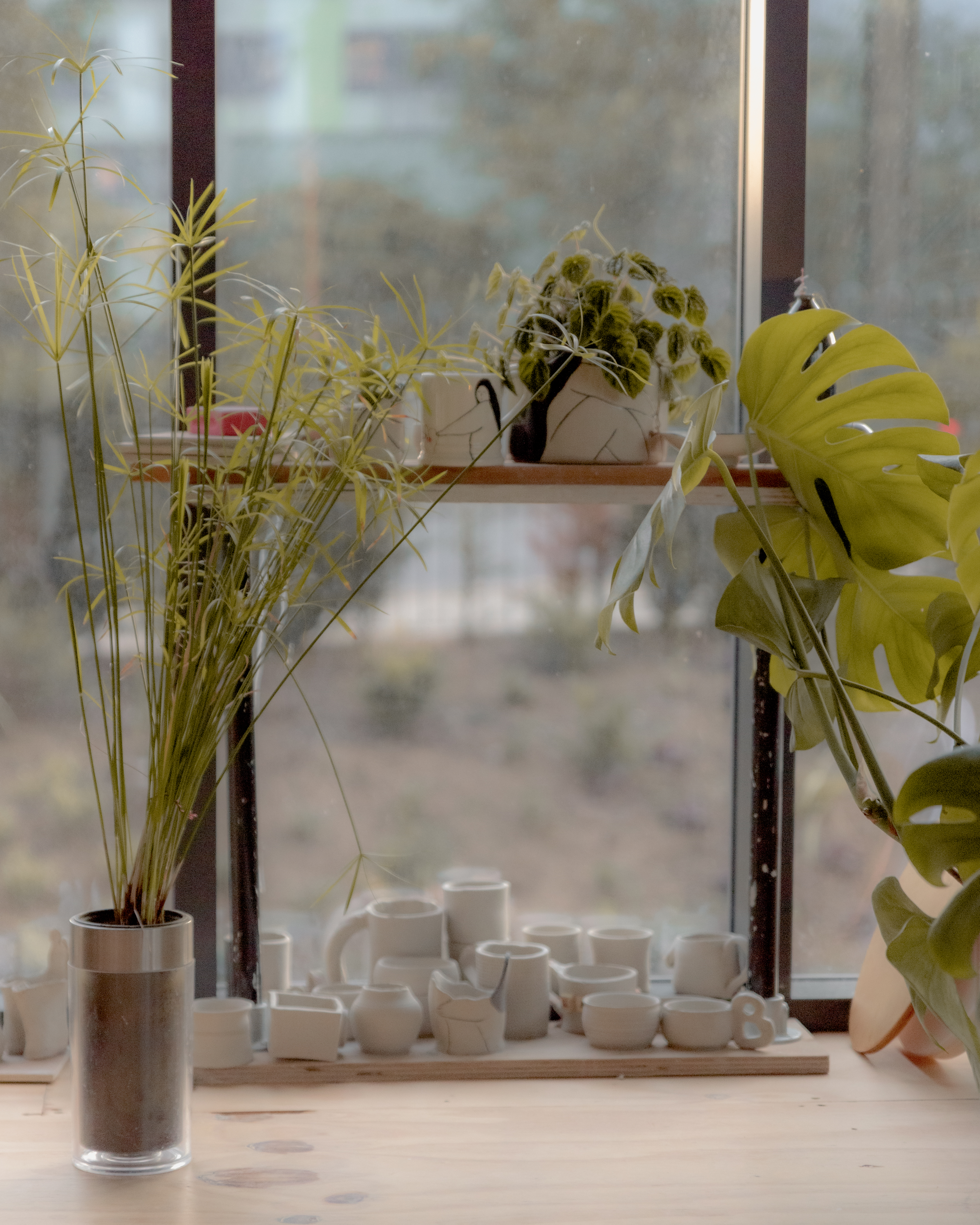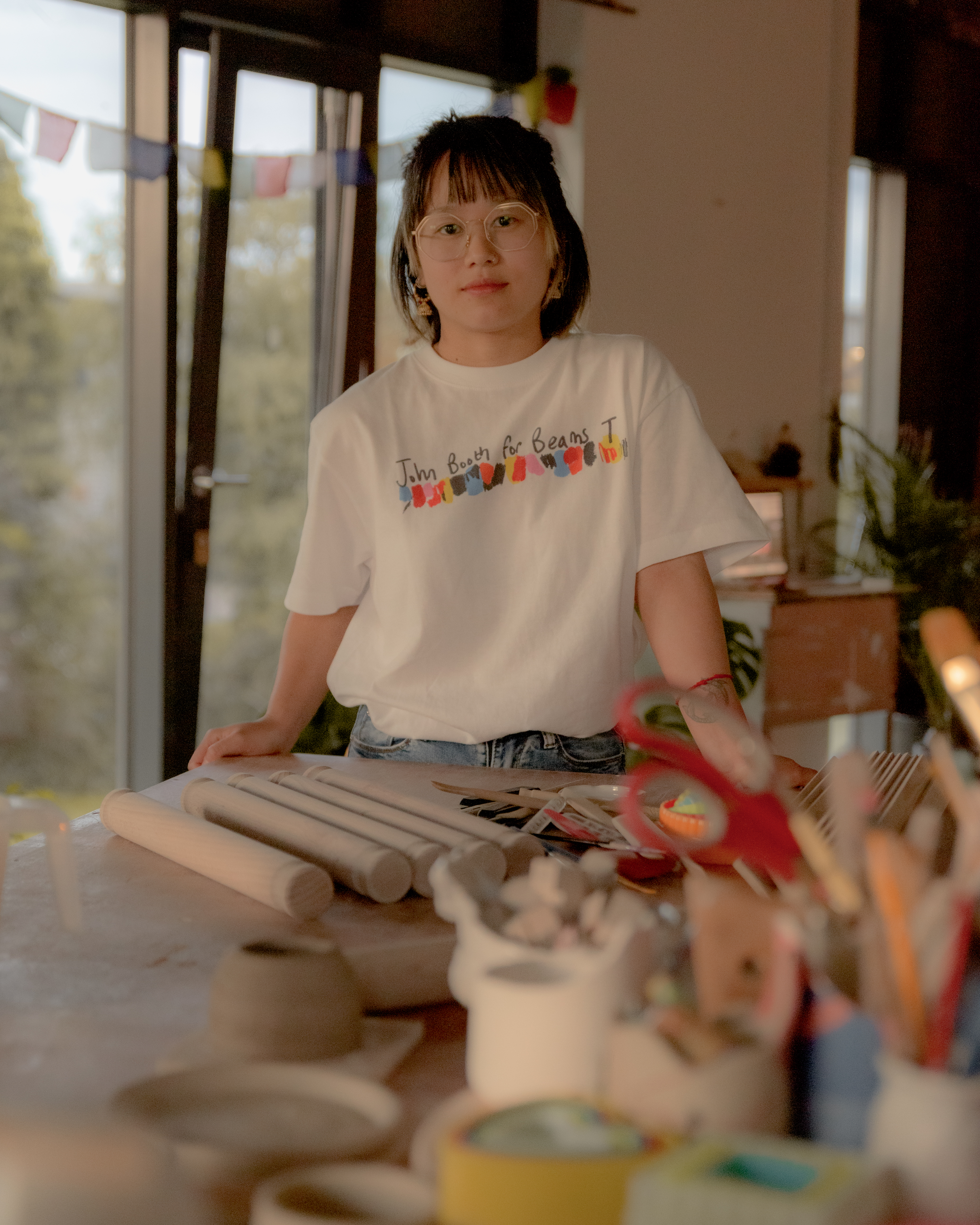Sampada Gurung
Sampada Gurung is a British-Nepalese illustrator and potter based in London. She is the founder of The Slightly Curious Studio where she runs weekly pottery classes and life drawing lessons. In 2020, she was also a contestant for the third series of The Great Pottery Throw Down which was aired on Channel 4. Through her masterclasses, she aims to make art accessible and encourages people to freely explore their creative side. Her art incorporates the delicate qualities of traditional pottery with a contemporary twist, with many of her designs being inspired by the surreal human form and symbolism. We met up with Sampada at her studios in Alperton to chat about her ceramics business and some of the influences behind her work.
![]()
![]()
![]()
OON: Hi Sampada, Thank you so much for agreeing to chat with us. Could you talk us through your journey in finding your passion and becoming a ceramicist?



My journey to becoming a ceramist was very organic, I actually studied Illustration and it was during my third year that I was introduced to ceramics by my friend. Because of her, I became interested in using my illustration in a different form and making things that weren’t just 2D and on paper. After graduating I was bit lost in terms of what direction I wanted to take but I remembered some advice I got from an art director who told me that it’s better to know early on what you don’t want to do, than to worry about having a clear plan of what you want to do. At that point, I definitely knew I didn’t want to work a 9-5 job and continue pursuing a career in the creative field.
My first job was working at a pottery cafe, working there led me to pursue pottery further and the more I learnt about it, the more I fell in love with the craft. I found it liberating how I could express myself and I didn’t feel restricted or feel like everything I made had to be perfect. It felt quite therapeutic. It took me a few years to feel comfortable in the craft and it wasn’t until 2019 that I started taking it seriously. When I tell my story out loud, it still feels bit surreal that I was able to break into a field without any prior connection, but I was lucky enough to meet the right people at the right time and now it feels like I traded a 9-5 for a 24/7 job.
What’s your approach to work?
I’ve always wanted to create things that suit my style and that I can be proud of. I’m not worried about being famous or successful in the traditional sense. I just want to put my work out there and if people like it, that’s great, and if they don’t then that’s fine as well.

What was your experience of growing up in two different cultures?
I moved to UK when I was around 7 or 8 years old so my upbringing has been pretty much a mixture of different culture. I find that growing up in such a diverse place like London has become a great advantage to shaping my values and outlook in life. Through my parents I’ve learnt how to balance my cultural heritage while adapting to the western up bringing. I was lucky enough to go to a school where I had friends from all parts of the world and naturally we all were blending in together without stressing the cultural difference.
Having spent the majority of your life living in London, do you feel there is enough British-Nepali representation here in the UK?
I have seen a lot of change in the past few years with younger people pursuing more creative ventures and not going the traditional route just because they feel like they have to. With art, it’s more difficult because while there are quite a few Nepali artists so if you aren’t in that scene then it’s hard to notice. But thanks to social media and different platforms, there is an opportunity being created for everyone to reach different audience and gain exposure.
Do you believe that there is a difference in how art is perceived in the UK compared to in Nepal?
I have noticed a gap in the way art is valued but at the same time there are similarities too. Art is very subjective so it’s hard to say what has more value. From my personal experience in both cultures art is seen more as a luxury and something you get into as a hobby, since breaking into the art world can be difficult if you don’t have connections or finance stability to support yourself. When I went to Nepal 4 years ago, I went to Bhaktapur and I was really shocked by how much handcraft art there is in Nepal. People dismiss it because they just see it as something that is done for tourists, but it came as a shock to me because if they came here, their art would be acknowledged.

Has your cultural background ever hindered your work?
I don’t want people to think that because I’m Nepalese, my success is an anomaly. My approach is always to make it about my talent. I want people to see themselves for themselves and wouldn’t want people to think they don’t belong in the industry just because of their nationality. As far as I am aware, art is something that does not discriminate you based on your appearance or where you come from. In fact, your cultural background has more advantage than disadvantage. The key to succeed anywhere is to work hard and smart. When you keep educating yourself in life and your subject of interest, I believe that will overshadow any form of discrimination people may come across. Which is why I don’t like to focus on negative aspect of cultural background based on other people’s opinion. I am actually very grateful for my Nepali fans because they have been very kind about my work. Their support feels like home. So, being from Nepali background has helped my career rather than it has hindered.
Who inspires you?
I am inspired by the work of my art friends and life generally. When you go through ups and downs, it inspires you to just go for things because nothing in life is certain and you might as well live the life you want. It’s because of this that I push myself to take risks and not think too seriously about my next steps.
What was it like setting up your own studio collective and did you face any setbacks?
After few years studio hopping and almost wanting to quit I somehow found myself running a studio. I went through lots of trial and error while adjusting to setting up the studio as a company and wasn’t until last year that I felt my studio was complete. Initially the idea of having my own studio was scary but my friends were very supportive and encouraged me to go for it. I didn’t plan on running classes but I loved the space and I wanted to share it with others. I wanted to use the name ‘The Slightly Curious’ for the studio, rather than my own name, I felt it was good for branding to have a studio that had its own identity, rather than making it about me as an individual. I think through seeing its evolution, it’s really changed my perspective with regards to trying new things and not being afraid to take risks.

Did you struggle to find your own style?
In the beginning, I did struggle to find my identity or style. When you are studying, you constantly have to do research and seek inspiration from other artists, which led me to have this bad habit where I would become too critical of my own work. After a while, I stopped thinking about whether anyone will like it or not and stop comparing myself to others. Once I stopped doing that I started to feel more comfortable with what I was creating and found a flow that worked. The thing with art is that it’s subjective so as long as I am happy with the work I am creating then I feel content with sharing with the world.
What was your experience of being on the Great Pottery Throw Down?
I was a fan of the show for a long time and was quite excited when they announced they would be bringing the show back and my friend, who is also a potter, made a pact with me that if he applied, I would have to as well. I thought, “why not?”, and I filled out the application very casually like I was talking to a friend because I didn’t think I’d get it. Even in the interview, I was quite blasé about it. It didn’t really hit me until I arrived on set and then I realised, “Oh, this is what you signed up for.” I didn’t think it through and I just wanted to enjoy the process, but a part of me now thinks that I should have had a plan or strategy since it was a competition. But at the same time, pottery is such organic work that if you put pressure on it and have to fit it to a brief, it takes away from the creativity. I wasn’t very proud of the moment where they caught me swearing on National TV / crying, but apart from that, it was a great experience. The show taught me a lot of things, for example, it made me venture outside my comfort zone and take my craft more seriously. Because of this experience, I’m now a lot more experimental with my techniques and enjoying trying out different ways of working.
What advice would you give to someone looking to go into pottery?
If you are considering going into pottery try it out and see how it goes. You don’t have to commit to it fully and there are various ways to go about it. There is a commercial route where you can make cups and plates and get commissions and do well from it. Whereas if you are wanting to go down the art route, it’s going to be a longer journey and you can’t be preoccupied with making money or instant success. Sometimes when your focus is just about that, it stops you from creating amazing art and you tend to go off trends that you know will sell well, rather than making something which will set your work apart. But at the same time you do need to have a business mindset, the market is very saturated so you need to find that thing which makes your work that much more special than someone else’s, even if you are making similar items to what’s already out there.

What are your upcoming plans and long-term goals with regards to your work?
I would love to do some bigger ceramic pieces and I also want to do more print work. I’m currently working on small pieces here and there which I sell, but I want to create some big pieces so I can have an exhibition of all my work. Another short-term goal for me would be to travel to Mexico, Japan and China to learn more about pottery and the different techniques out there. Unfortunately, due to Covid, this plan has been put on hold but hopefully I’ll be able to go travelling late next year. The aim is to gain as much knowledge as I can and then apply it to my work. At the moment, my goal is just to carry on making and doing what I can to push myself and improve my skill set. It’s every artist’s dream to have their work gain traction, but at the same time, I’m not focusing on fame or money. Success for me is about being happy and mentally content, I don’t think there will ever be a point where I can say that I’ve made it - I’m not measuring my success by what I gain, but instead by seeing my accomplishments and how they have helped me evolve as a person.
My idea for later in life was always to have a studio and it just so happened that I achieved this a lot earlier than I expected. I do want to go into art therapy and have a space where I can run lots of different workshops where people can use art to de-stress and to distract themselves from the things they do in their everyday lives. I think now more than ever this kind of thing is needed, especially for people who don’t feel comfortable doing traditional forms of therapy.
